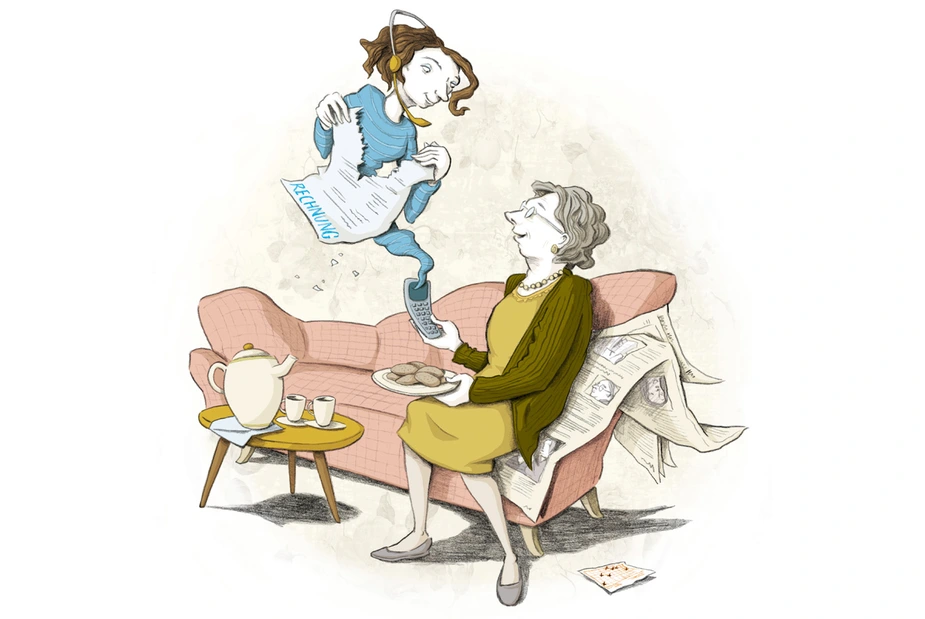When I was a Call Centre Fräulein: My job in customer service
Essay by Lea Streisand, Berlin-based columnist, radio host and writer
There was a time when I had a real job. It’s been a while. This was back when I was still at university and didn’t know what I wanted to be. Becoming a writer was not an option. Everybody knows you can’t earn money with art. However, I needed some cash, if only to pay for cigarettes, coffee and apple juice, my dietary staples at the time, so I entered the service industry and started working as a call centre agent. The English was also the job title in German.
My grandmother would have said “Telefonfrollein” – a Fräulein on the telephone. On three days a week, my job was to be yelled at for four consecutive hours by angry magazine subscribers and to try to give friendly, competent answers.
“You, Fräulein, another day without a paper in my mailbox. I’m cancelling!”
“Oh no, that sounds bad. Please give me your customer ID and I will have a look.”
“Customer ID. How should I know. The name’s Müller.”
The problem was that it was forbidden to search the database for the name Müller without any additional customer information like street name, number, postal code or first name, for the simple reason that the database contained more people called Müller than a newspaper contained words. The servers would have just crashed.
“Mr. Müller, could you please tell me your location. It makes it easier to find you.”
“No, why? What more do you want?”
The call centre job was fun most of the time. Contrary to studying German in overcrowded seminars and obscure lectures, which made me feel like a complete idiot, the subscriber service job gave me the feeling of being useful. Helping people. In the truest sense of the word. Service is the abstract noun of the verb “to serve”, to wait on somebody or dish up. Borrowed from French, it was first recorded in German in the 16th century. Its roots go back to the Latin word “servus”, meaning servant or slave. By the way, the eponymous Bavarian salutation indeed has the same roots. It roughly translates to: “I am your servant!”.
On a different occasion, I was talking to an old lady on the phone, let’s call her Mrs. Schönlein. She wanted an address so she could send 17.50 euro for her trial subscription. “Don’t send it, “Mrs. Schönlein,” I said. “You need to transfer the money.”
“Mrs. Schönlein, however, had different plans.
“I have already put a 20 euro note in an envelope,” she told me friskily.
“It’s sealed. Should I put your name on it? You can keep the change. Buy yourself some flowers and put in on your windowsill.”
I took a deep breath quietly. I assumed Mrs. Schönlein was in her late eighties. Which dubious seller sold her a trial subscription? I was sure she hadn’t thought of cancelling it in time.
“Mrs. Schönlein,” I said calmly. “Surely you have a checkings account?”
“Check what? I don’t think so,” said Mrs. Schönlein absent-mindedly.
I tried a different angle.
“Mrs. Schönlein,” I said. “I’m sure you receive a pension.”
“Yes”, said Mrs. Schönlein loud and clear - and happy she could give a positive answer.
“Excellent,” I said relieved. “Your pension, where does that go?”
“Well,” said Mrs. Schönlein pensively, “I buy a lot of things for my grandchildren. And I play lotto every Wednesday.”
For a brief moment, I lowered my forehead onto the cooling surface of my desk. That helped.
“Mrs. Schönlein, please listen to me,” I said. “Please tell me where you live.” My plan was to cancel the trial subscription manually and cancel the invoice. It seemed like the reasonable thing to do. “My address?” she cried. “Oh, golly, will you come and visit me? Give me a second, dear, I will just go and check if I have some biscuits left in the cupboard.”
We were disconnected. Either Mrs. Schönlein ripped her phone from the wall or just “hung up” for a second looking for those biscuits. I will never know. But I wish her all the best. And good luck for lotto.
